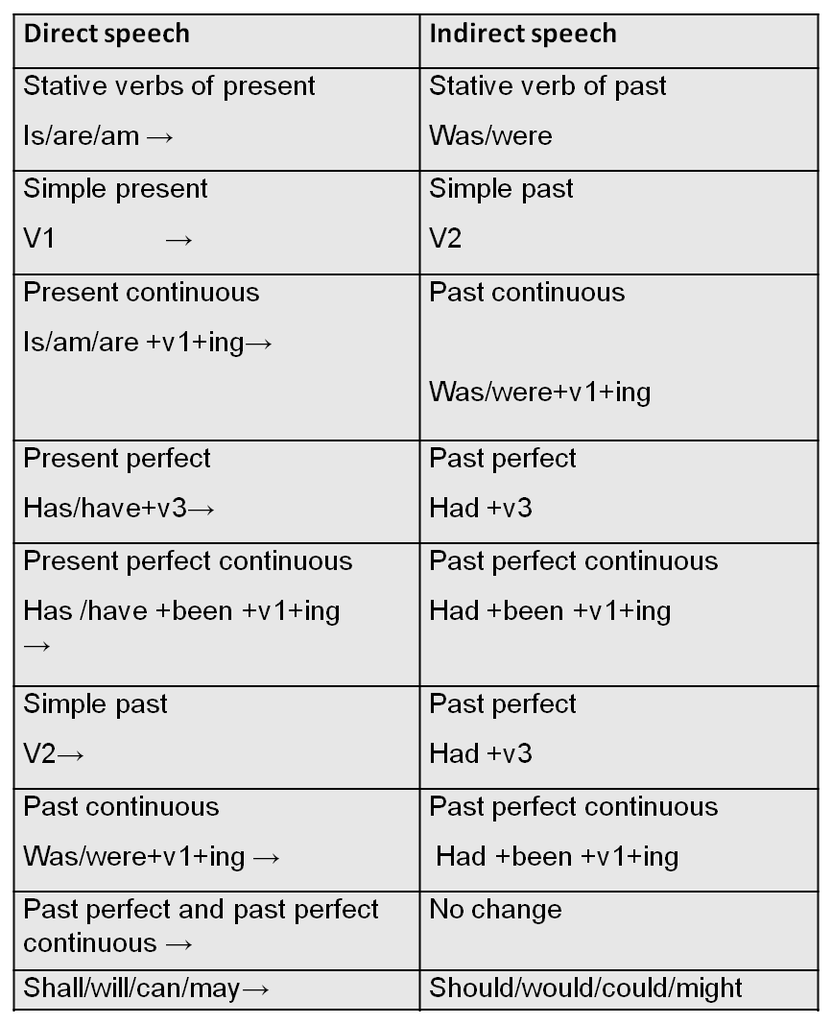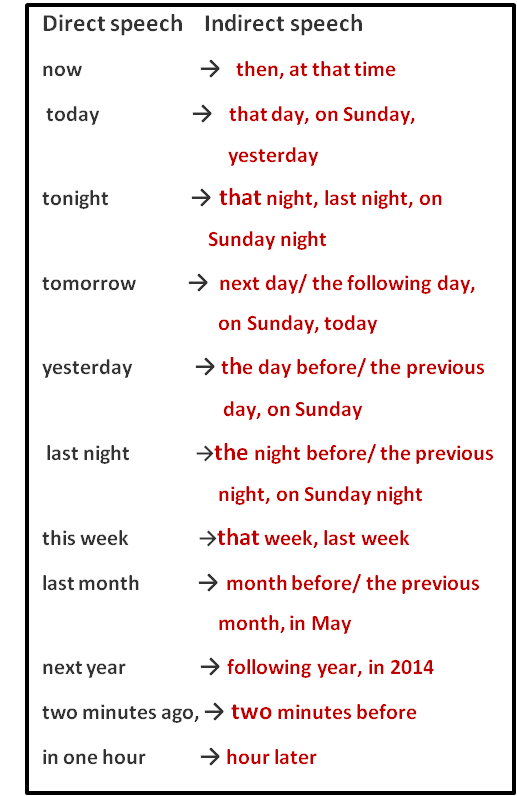- Books Name
- Online English tutor English Book
- Publication
- Online English tutor
- Course
- CBSE Class 10
- Subject
- English
Direct and Indirect (reported) Speech
In our daily conversation many times we describe or report an event or action that happened, and very often that includes repeating what someone said.
In order to describe what people said there are two different types of speech –
- Direct speech
- Indirect speech (or reported speech)
What is Direct & Indirect Speech?
Direct speech – in this type of speech qwe report the message of the speaker in the exact words as spoken by him.
Direct speech example: Maya said ‘I am busy now’.
Here,
‘I am busy now’ are the exact words of the speaker.
Indirect speech: In this type of speech we report only the message of the speaker in our own words , we don’t report the exact words of that speaker.
Indirect speech example: Maya said that she was busy then. – only message is reported not the exact words of speaker
Reporting verb and reported speech
The speech of a person can be divided into two categories
- Reporting verb (verb of the first clause)
- Reported speech ( words within inverted commas
For ex.
She said, “I will be late today.”
Here,
First clause is ‘She said’ where
Said = reporting verb
Words within inverted commas are
‘I will be late today ‘= reported speech
So,
Important points to convert direct speech into indirect speech
- No punctuation marks are used except full stop.
- Tense of the reported speech is changed if the reporting verb is in past tense.
- No change in the tense of the reported speech if it expresses any universal truth, habitual action or historical facts.
Rules to change the reporting verb
Says – says
Says to – tells
Said – said
Said to- told
Rules to change the Pronouns of reported speech
- First person is change according to the subject of reporting verb
- Second person is changed according to the object of the reporting verb
- Third person is not changed
Rules to change the Direct speech into Indirect speech ( if the reporting verb is in past)
1. Simple present becomes simple past
Ex.
Direct- He said, “She often hesitates while speaking in class”.
Indirect- He said that she often hesitates while speaking in class. (Habitual action thus no change in tense)
Direct- He said, “I go to park”
Indirect- He said that he went to park. (Habitual action thus no change in tense)
Direct- He said, “my mother is in the hospital.”
Indirect- He said that his mother was in the hospital.
2. Present continuous becomes past continuous
Direct- He said, “She is watering the plants.”
Indirect- He said that she was watering the plants.
Direct- He said, “ I am looking for my purse”
Indirect- He said that he was looking for his purse.
3. Present perfect becomes past perfect
Direct- He said, “We have taken our meal.”
Indirect- He said that they had taken their meal.
Direct- He said, “you have won the match.”
Indirect- He said that I had won the match.
4. Present perfect continuous becomes past perfect continuous
Direct- He said, “I have been suffering with this disease since last week.”
Indirect- He said that he had been suffering with that disease since the previous week.”
Direct- He said, “My parents have been looking for new accommodation for two months. ”
Indirect- He said that his parents had been looking for new accommodation for two months.
5. Simple past becomes past perfect
Direct- He said, “We visited here a month ago.”
Indirect- He said that they had visited there a month before.
Direct- He said to us, “The police didn’t arrest the thief today.”
Indirect- He told us that the police had not arrested the thief that day.
6. Past continuous becomes past perfect continuous
Direct- He said, “These boys were quarrelling today”
Indirect- He said that those boys had been quarrelling that day”
Direct- He said, “you were sleeping when I came.”
Indirect- He said that I had been sleeping when he had come.
7. Past perfect remains unchanged
Direct- He said, “They had gone yesterday.”
Indirect- He said that they had gone a day before.
Direct- He said, “you had slept when I came.”
Indirect- He said that I had slept when he had come.
8. Past perfect continuous remains unchanged
Direct- He said, “I had been riding the bicycle since morning.”
Indirect- He said that he had been riding the bicycle since morning.
Direct- He said, “I had been swimming for a week”
Indirect- He said that he had been swimming for a week.
9. Shall/will/can/may get converted into should/ would/could/might
Direct- He said, “I shall drop you home.”
Indirect- He said that he would drop me home.( Shall is often converted into would)
Direct- He said, “My brother can be coming by bus.”
Indirect- He said that his brother could be coming by bus.
Direct- He said, “ He may have cleaned the home.”
Indirect- He said that he might have cleaned the home.
Direct- He said, “ Raman shall have been walking for an hour.”
Indirect- He said that Raman would have been walking for an hour.

Changes in time or place expressions in direct speech to indirect speech
Words showing nearness in time and place are changed into the words showing distance in time and place.
It depends on when we heard the direct speech and when we report speech. (Generally at the time of speaking)
example:
if it is Sunday
Mary says "My parents are arriving today".
If Mona tell someone on Sunday
Mona say "Mary said that her parents were arriving today".
But on Tuesday,
Mona say " Mary said that her parents were arriving yesterday".
In the same way,
on Wednesday
Mona say "Mary said that her parents were arriving on Monday".
after a week
Mona will say "Mary said that her parents were leaving that day".

Place words (should be changed according to the given situation)
- When the speech is reported in the same place - no changes in place words
- When the speech is reported in the different place - due changes in place words
Ex.
If the speech is reported at the same place.
He said: "Sam has been here." → He said that Sam had been here.
If the speech is reported at the different place.
He said: "Sam has been here." → He said that Sam had been there.
Direct speech Indirect speech
Here → there, in Starbucks
This → that
this book → the book, that book,
in this room → in the room, in that room
Conversion Of Interrogative sentences into Indirect speech
- ‘Asked’ is used to introduce reported speech.
- The interrogative form is changed into Assertive Forms
I.e.
The auxiliary verbs is shifted back to the subject.
Ex.
Direct speech: “Where are you going?”
Reported speech: He asked me where I was going. (Verb shifted back to the subject)
- No auxiliary verb is used , except in negative questions.
Ex.
Direct-I said to him,” Do you know how to dance.”
Reported- I asked him if he knew how to dance. (‘Do' is dropped)
Yes / no questions
structure:
'ask' + 'if / whether' + clause:
- Direct speech: Sue said “Shall I ever forget her”
Reported speech: Sue asked if she would ever forget her. - Direct speech: He said “Do you have a laptop?”
Reported speech: He asked if I had a laptop.
Interrogatives with Question words
structure:
'ask' (or another verb like 'ask') + question word + clause.
- Direct speech: Sam said “Why is he wandering here and there ?”
Reported speech: Sam asked why he was wandering here and there. - Direct speech: She said “What do you want?”
Reported speech: She asked me what I wanted.
Conversion Of Imperative sentences into Indirect speech
- Reporting verb is changed into the verbs expressing command request or advise
e.g.
Ordered, advised, requested, commended, urged, forbade, told, asked etc.
- Imperative mood is changed into infinitive mood by putting ‘to" before the verb
- In case of a negative imperative, the auxiliary ‘do’ is dropped and ‘to’ is placed after ‘not’
- No conjunction is to be used to introduce the Reported speech
Ex.
Direct speech- He said to me, “do it.”
Reported speech -He asked me to do it.
Direct speech- The teacher said to the boys, “do not make a noise .”
Reported speech -He asked the teacher ordered the boys not to make a noise.
Direct speech- The teacher said to the boys, “do not waste your time.”
Reported speech – The teacher advised the boys not to waste their time.
Direct speech- The doctor said to the patient, “Do not have sweets, as there is cavity in the teeth.”
Reported speech – The doctor forbade the patient to have sweets as there was cavity in the teeth.
Conversion Of sentences beginning with ‘Let’ into Indirect speech
When Let expresses
- A proposal – reporting verb changes into ‘proposed or suggested’ and ‘Let’ is replaced by ‘should’
Ex.
Direct speech- Mohan said to me, “ Let us go to park .”
Reported speech – Mohan Proposed me that we should go to the park.
Direct speech- I said to my friends, “ Let us wait for the result.”
Reported speech – I proposed my friends that we should wait for the result.
- A permission – it changes into ‘might be allowed ’ or simply into ‘to Let'
Direct speech- He said to the peon, “ Let the visitor come in.”
Reported speech – He ordered the peon that the visitor might be allowed to come in.
Or
Reported speech – He ordered the peon to let the visitor come in.
Conversion Of Optative sentences into Indirect speech
- Reporting verb ‘said’ is changed into ‘wished or prayed’
- ‘That’ is used to introduce the reported speech
- optative sentence changed into an assertive sentence and the sign of exclamation ‘!’ is replaced by a full stop.
Direct speech- He said to me, “May you be happy.”
Reported speech – He wished that I might be happy.
Direct speech- They said, “Would that I were rich.”
Reported speech – He wished that he had been rich.

 Online English tutor
Online English tutor
